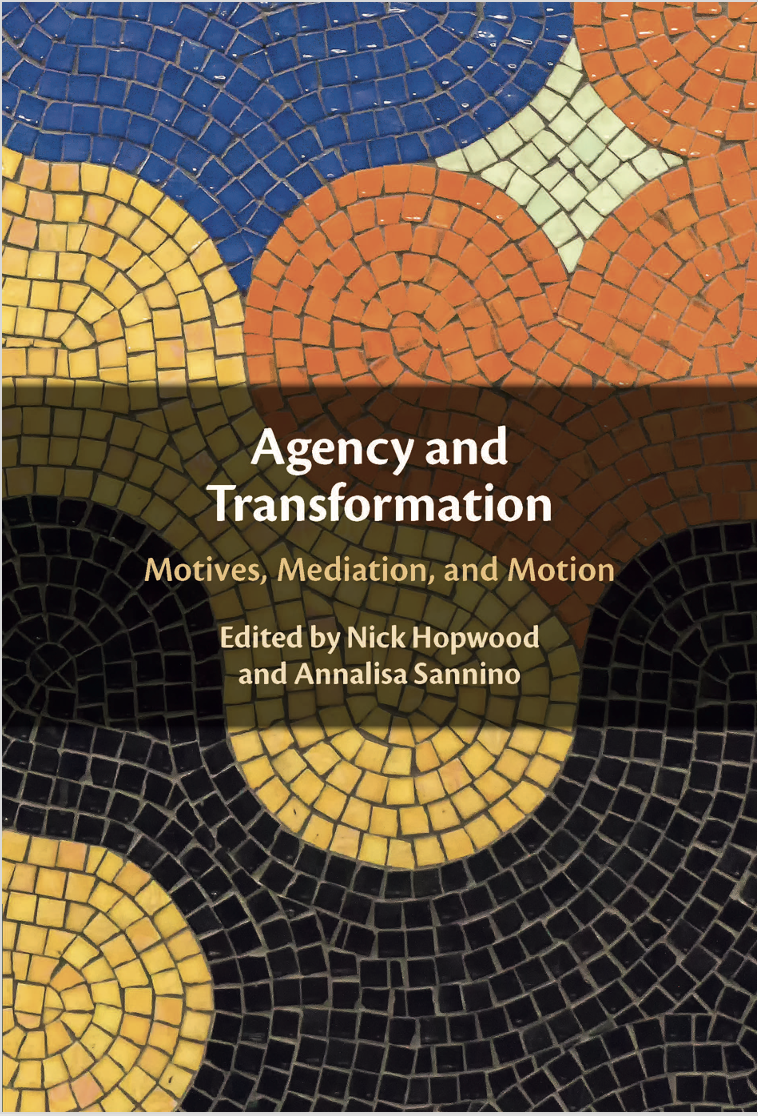Book chapters
Chapter 1: Motives, Mediation and Motion, Nick Hopwood and Annalisa Sannino
Chapter 2: Toward a Power-Sensitive Conceptualization of Transformative agency, Annalisa Sannino
Chapter 3: The Tasks of Reality and Reality as the Task – Connecting Cultural-Historical Activity Theory with the Radical Scholarship of Resistance, Anna Stetsenko
Chapter 4: A Relational View of a Future-Orientated Pedagogy, Anne Edwards
Chapter 5: From Future Orientation to Future-Making – Towards Adolescents Transformative Agency, Yrjö Engeström, Pauliina Rantavuori, Piia Ruutu, Maria-Tapola Haapala
Chapter 6: Excluded Lives – Questions of Agency and Transformation in the Practice of Exclusion from School, Harry Daniels, Ian Thompson, Alice Tawell
Chapter 7: Children’s and Youth’s Civic Projects and Responsible Agency, Jaakko Hilppö, Antti Radial
Chapter 8: Decolonizing Agency – Future-Makinh with Indigenous Communities, Aydin Bal, Aaron Bird Bear
Chapter 9: Unpacking Social Articulation of Agency – Vexed Questions for Responsive Professional Action, Prabhat Rai
Chapter 10: The Emancipatory Nature of Transformative Agency – Mediating Agency from Below in a Post-Apartheid Land Restitution Case, Heila Lotz-Sisitka, Reuben Thifhulufhelwi, Charles Chikunda and Maletje Mponwana
Chapter 11: Choice in Childbirth, Agency and Collective Action – Cesarean Sections and Birth Plans in Brazil, Denise Yoshie Niy, Carmen Simone Grilo Diniz
Chapter 12: Transformative Agency by Double Stimulation in an Ecological Agroforestry Association from Brazil – Reflections from a Change Laboratory Intervention, Osni Arturo Francisco Junior, Manoel Flores Lesama, Marco Antonio Pereira Querol
Chapter 13: Transformative Agency and the Cultivation of Innovations in Frontline Homelessness Work, Hannele Kerosuo, Esa Jokinen
Chapter 14: Children’s Agency during the COVID-19 Pandemic in China, Ge Wei
Chapter 15: Agency As the Direction and Reach of Actions – A Theoretical Outline, Nick Hopwood
Online panel discussion building and expanding on the contents of the book, February 6, 2024


Some thoughts after the panel event when Brett Bligh, Monica Lemos, Yannick Lemonie and Joce Nuttall responded to the book 🙂
– There were interesting questions and points about how agentic accomplishments often rely on getting particular others involved (whether decision makers, stakeholders etc). One thing I think our book shows is how this doesn’t give us a diluted sense of agency (it was never in one person to begin with), but as Brett says, how collective objects can strengthen rather than weaken individual goals. If we need to get X person in the room to make the change happen, that doesn’t make us weaker.
– Issues came up in relation to participants we work with, who might be hungry for solutions (rather than historical analysis), might feel isolated and need to be provoked into realising they are not alone, might be pessimistic when we cannot afford pessimism as scholars of transformation, who might have felt contradictions before they thought or articulated them. This is where the history of things like the Change Lab, and the ways the tools and processes of formative interventions are developing and evolving is so exciting to me!
Overall the panel put the book in dialogue with wider scholarship and efforts to work with people on worldly transformation – what a pleasure it was to see that happening 🙂
Nick
Nick Hopwood
7.2.2024 23:21